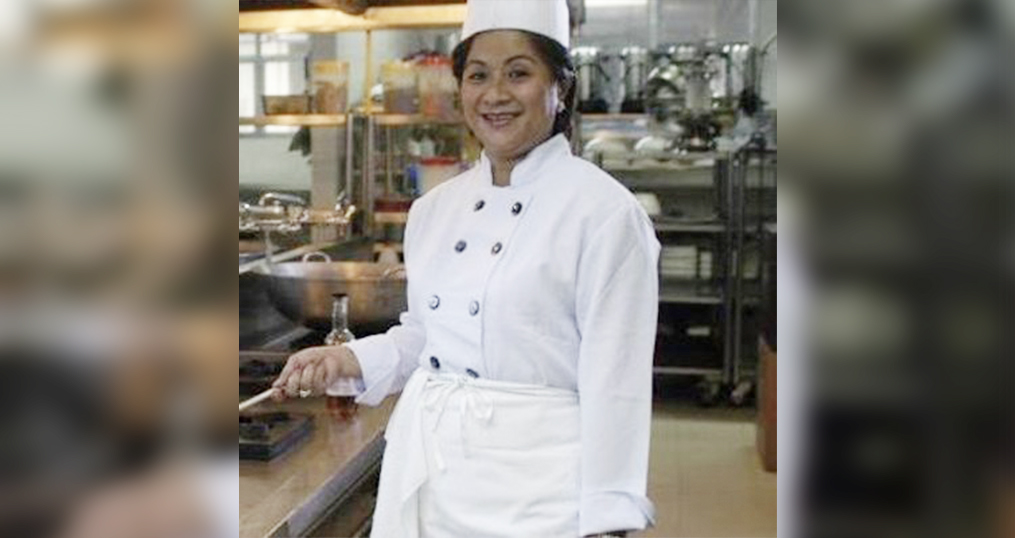10 August 2021
For the better part of the last six years, Hizon’s has been the Club’s main concessionaire, serving up Club classics and comfort food to Members dining at the Sports Lounge, Sports Café, Cogon Village, and recently, at the East Terrace. Octavia “Baby” Hizon, CEO of Hizon’s Catering Services, Inc., got her early training in the kitchen from her mother, and then learned to cook sophisticated party fare and cater for large groups from her mother-in-law.
Early beginnings
How did you develop your passion for food and cooking?
Actually, I would say it was already there because I grew up in the province and it is expected that any woman in the family know how to cook. My mother would always tell me that this was just one of the many things I needed to learn for me to know how to manage my own household someday. The thinking is very provincial and traditional, and that was how we were brought up in the family. At an early age, we were all given our own responsibilities, like going to the market and deciding what we wanted to cook for the day. After buying the ingredients, our mother was there to just assist us or coach us.
When I got older and got into college, all of us ten siblings got an apartment and we all took turns to create a menu for the week, and whoever’s turn it was for that week also went to the palengke to buy the ingredients. In a way, it was a very early training ground for me.
Little did I know that the family I married into was a family of foodies, and that is how I [learned] how to cook more sophisticated food, because what I knew was local traditional fare like sinigang, ginisang munggo or pinakbet. My mother-in-law’s a very good cook and our family always had these Sunday lunches that feed 40 to 50 people. That was where I learned how to cook roast beef, lasagna, lengua, chicken galantina, etc.
My mother-in-law enriched the training that I had with my own mother, and the Sunday lunches was where it all started because I would always help to plan them out, and my mother-in-law had recipes that we would always use. It was my catering training ground as it was always bulk cooking, good for 40 to 50 people. I didn’t know then that it would be my training ground and that it would also be my business one day.


How did you manage to put up Hizon’s Catering while, at the same time raising a family of seven kids?
When I got married, my husband asked me to resign because he wanted us to have kids and raise our own family. We had four boys in a row, and we prayed real hard to have a girl and we were lucky to be blessed with Anne (Chef Abby Hizon). When I gave birth to Anne, I felt like doing something but at the same time, I want to be able to still be close to look after my kids.
At the time, we were very active in Couples for Christ and Jun Simon was part of that community and he was then mayor of Quezon City. Back then, most of our group meetings were done at our place because we could accommodate a large group. Our place is situated in my husband’s family compound, and there’s a pool, a pavilion – kind of like a function area. Jun Simon usually came to the meetings without eating any dinner, so I would always serve him with whatever it was that we had at home. He told me the food was always so delicious and asked me if I wanted to try to provide catering for his press meetings at City Hall since I live close by. Encouraged, I accepted an order for simple fare – sandwiches or lasagna good for 20 – and I enjoyed doing it. That is how we got started.
What were the challenges you encountered then as a budding entrepreneur and chef, and a young wife and mother?
The start of my business was very smooth sailing. I was very lucky, in that I didn’t experience so much hardship because I was gifted with good people to help me get started – my househelp, my mother-in-law’s cook, my laundry girl and the waiters that were on call. Everything went on so smoothly; whenever I look back, I always think that maybe that was God telling me that this was what He wanted me to do. With the support of my husband, we saw the business that came was proportional to the number of my people – I only had enough with the number of help I got in the beginning, and as the number of help got bigger, my business also grew. I did not encounter many issues with my staff or with my finances. I believe that was God guiding me and my business.
What are your signature dishes?
The tastes now are different from my time. When I was the one handling the business, my signature dishes were lasagna, grilled blue marlin a la pobre, prime rib roast beef, pastel de lengua and chicken galantina. Those were the most popular items. For dessert, there’s tocino del cielo, buko pandan and fruit salad.
Now, my children have joined me in my business. My eldest is a chef and got his education at CCA in San Francisco, USA. My second son, Joseph, is the general manager. Abby is also a chef and she studied in New York. They are now the ones developing the food. We have our R&D section; that’s why we always have new products to offer. Now, their best-seller is still the roast beef, but cooked in a different way. During my time, the roast beef took 16 hours in the oven, but now they do it via the sous vide machine; it takes a little longer to cook, but the meat is much more tender. Also, during my time, I was using prime rib, which is quite pricey, and with the catering business being so competitive nowadays, you have to be more prudent and smarter about your food-costing. The kids have found a way to use a different cut of meat and still make a classic roast beef without it being too expensive.
What is your cooking philosophy?
My cooking philosophy is, when you cook, you must put your heart into it. You don’t rush it or just do it any way you want it. You must make sure you have given your best and you gave it all, and you never cut corners. What I mean by not cutting corners is, when it calls for a certain cooking procedure, no matter how difficult the procedure is, do it. If it calls for a certain ingredient and it is a not a common ingredient, you go find it.
In your experience, what is the key to developing a good team?
For you to be able to develop a good team, a loyal team, you have to treat your team as a family. Our business started so small, so we are essentially like a family. I know their personal lives; I am the first person who knows if they encounter any hardships and I am also the first person that extends help to those who need it. Some of my staff have been with me for the past 15 years, some are going 20, and I have some staff that I have been asking to retire because they are not getting any younger and the kitchen work can be very stressful for them. I still have my sous chef who was my former labandera. I sent her to study cooking. My warehouseman is my former gardener. They have been with me since the beginning and they are very hardworking. I believe that if you treat your staff well, respect them and treat them like a family, you can push them and drive them to become better versions of themselves.
How has the pandemic impacted your business?
We have made some changes because the impact is huge. There are no events so what do we do, right? Here at the Main, we shifted to deliveries but no matter how we look at it, the returns are not much because the commissary is big, and its operating cost is equally huge.
When we do events, the minimum number of orders is usually for 150 persons, but for deliveries, we only do an order good for four to eight persons. With this, we were able to mobilize and provide a livelihood to some of our people who have motorcycles. We had to suspend our security and had our waiters temporarily act as one because we do not have any catering orders for them.
We kept going and we kept on operating even if we knew we were registering losses, just so we could give our people work. It has really affected us, and up until now we are still losing, but we are trying to forge on because we know this will end soon.
What do you love to do as a family?
We love to eat a lot and travel. Once a year, we travel, and we don’t have the budget for shopping because most of the budget goes to eating out.
Also, before the pandemic, we’d gather once a week and dine out as a family. We’d take turns choosing the restaurant for the week and we usually just meet there, and that was our bonding time as a family.
What do you miss the most about pre-pandemic life?
I miss going to my events. I miss seeing my people. Sometimes they call to tell me that they also miss me, and I tell them that I miss them, too, and that I want to see them. Sometimes, they come over and we only wave and exchange stories through the window. I miss the times when I was at the commissary, doing my rounds, seeing how the catering is operating. Thinking about it, I am amazed at how these all started in my own little kitchen. I cannot even visit the commissary because my kids are not allowing me to go, but I really miss it.
What is the very first thing you are going to do after you get vaccinated?
I will visit the commissary and see if everything is in proper order. I will visit every department and do my rounds.


